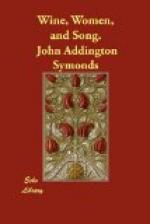Our knowledge of this poetry is derived from two chief sources. One is a Ms. of the thirteenth century, which was long preserved in the monastery of Benedictbeuern in Upper Bavaria, and is now at Munich. Richly illuminated with rare and curious illustrations of contemporary manners, it seems to have been compiled for the use of some ecclesiastical prince. This fine codex was edited in 1847 at Stuttgart. The title of the publication is Carmina Burana, and under that designation I shall refer to it. The other is a Harleian Ms., written before 1264, which Mr. Thomas Wright collated with other English MSS., and published in 1841 under the name of Latin Poems commonly attributed to Walter Mapes.
These two sources have to some extent a common stock of poems, which proves the wide diffusion of the songs in question before the date assignable to the earlier of the two MS. authorities. But while this is so, it must be observed that the Carmina Burana are richer in compositions which form a prelude to the Renaissance; the English collections, on the other hand, contain a larger number of serious and satirical pieces anticipating the Reformation.
Another important set of documents for the study of the subject are the three large works of Edelstand du Meril upon popular Latin poetry; while the stores at our disposal have been otherwise augmented by occasional publications of German and English scholars, bringing to light numerous scattered specimens of a like description. Of late it has been the fashion in Germany to multiply anthologies of medieval student-songs, intended for companion volumes to the Commersbuch. Among these, one entitled Gaudeamus (Teubner, 2d edition, 1879) deserves honourable mention.
It is my purpose to give a short account of what is known about the authors of these verses, to analyse the general characteristics of their art, and to illustrate the theme by copious translations. So far as I am aware, the songs of Wandering Students offer almost absolutely untrodden ground to the English translator; and this fact may be pleaded in excuse for the large number which I have laid under contribution.
In carrying out my plan, I shall confine myself principally, but not strictly, to the Carmina Burana. I wish to keep in view the anticipation of the Renaissance rather than to dwell upon those elements which indicate an early desire for ecclesiastical reform.




